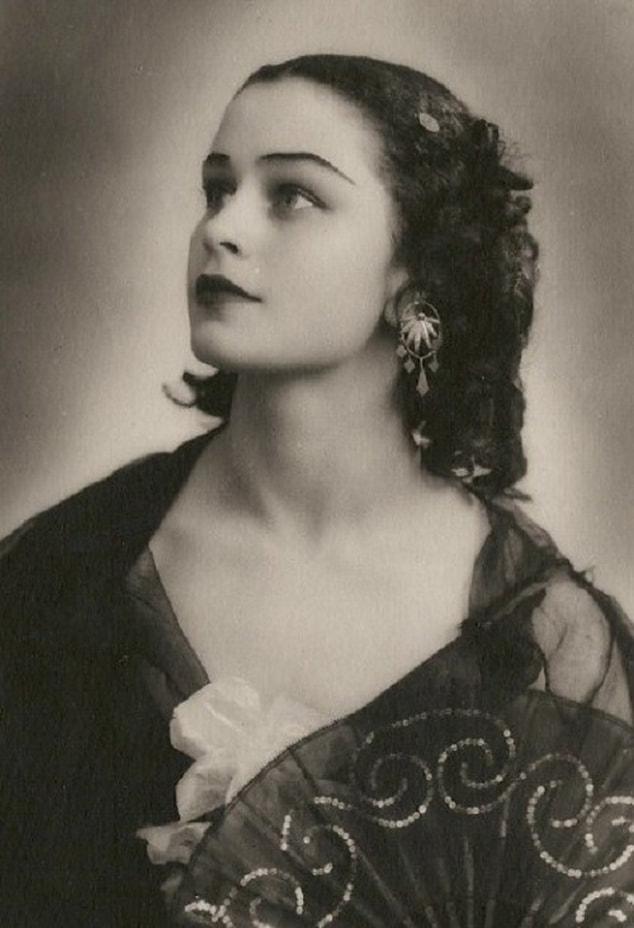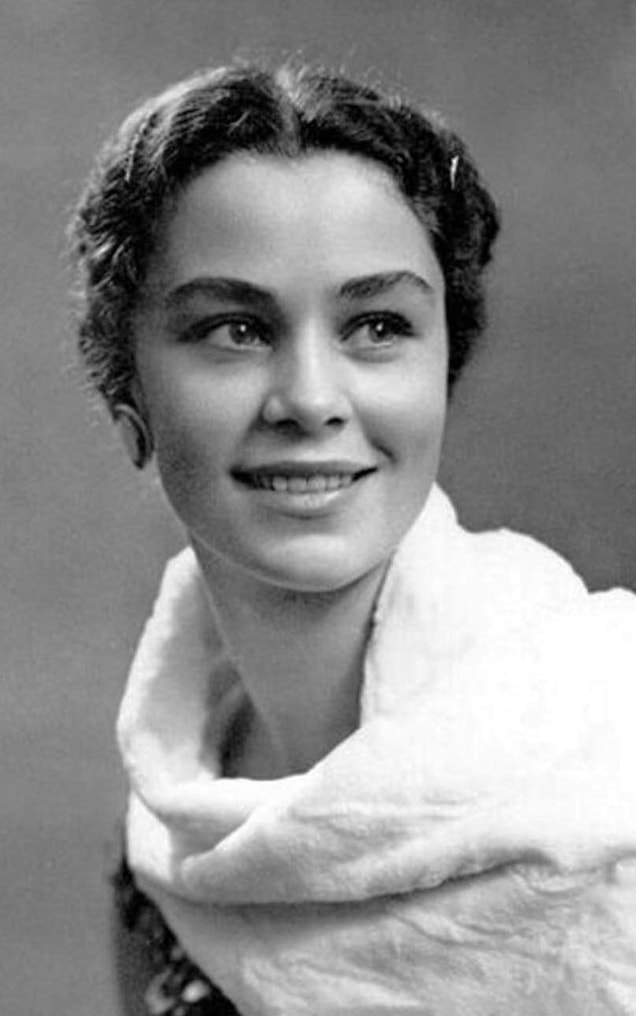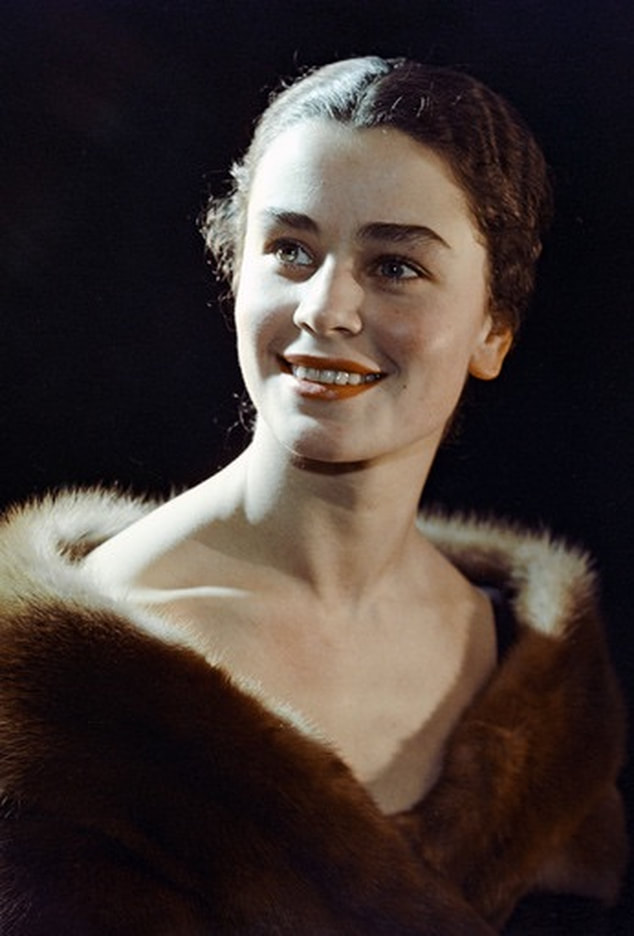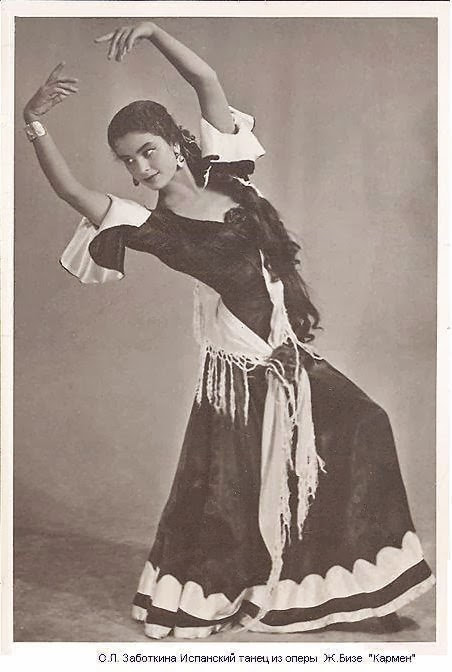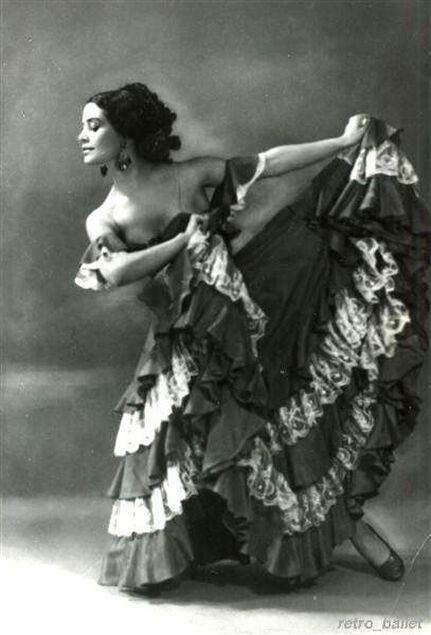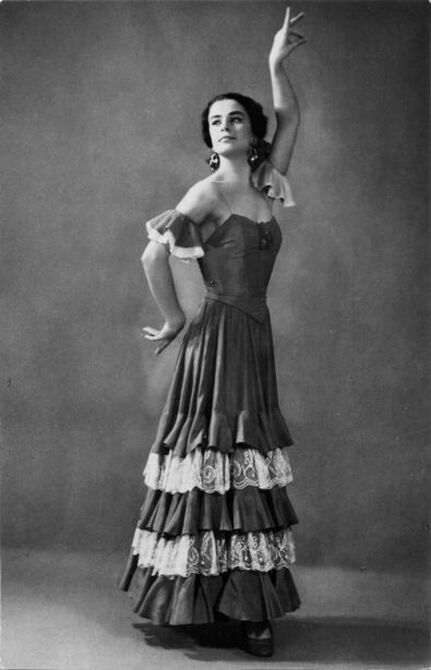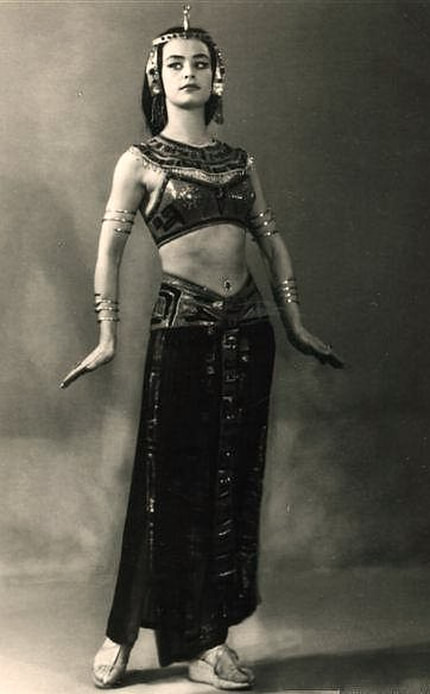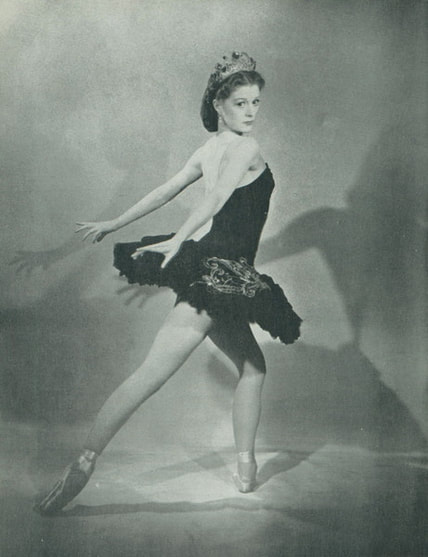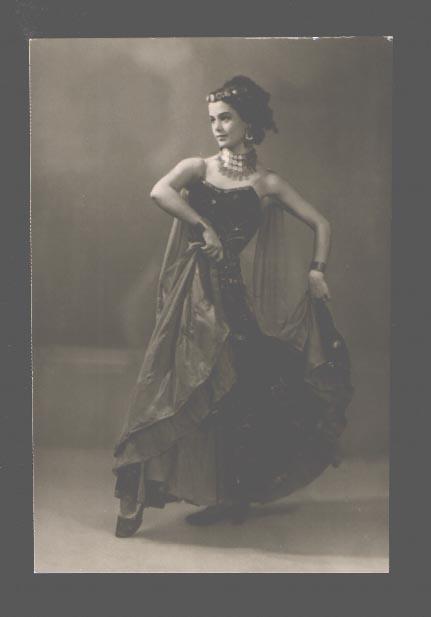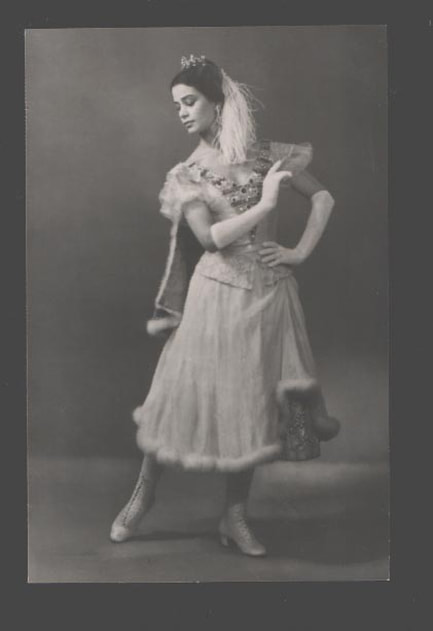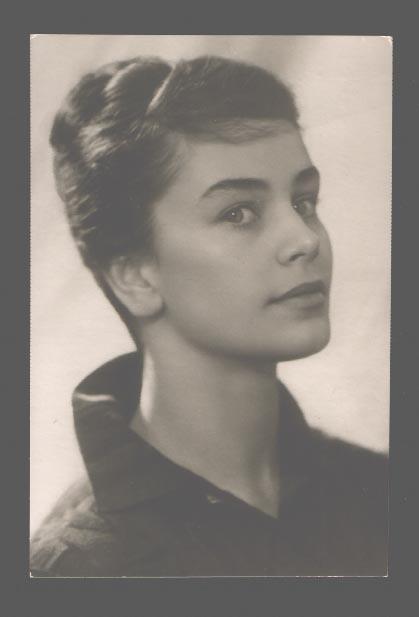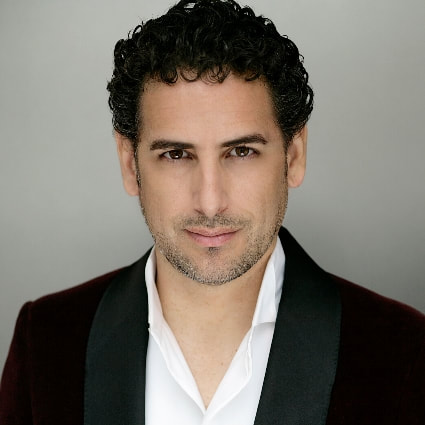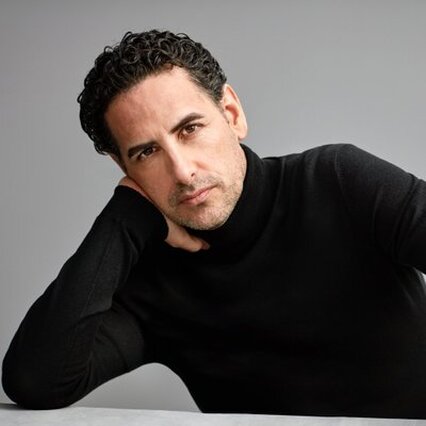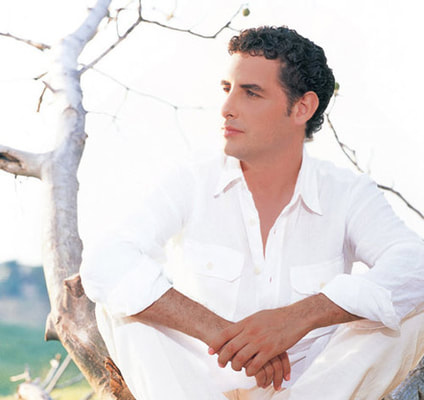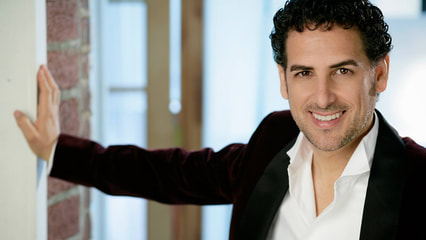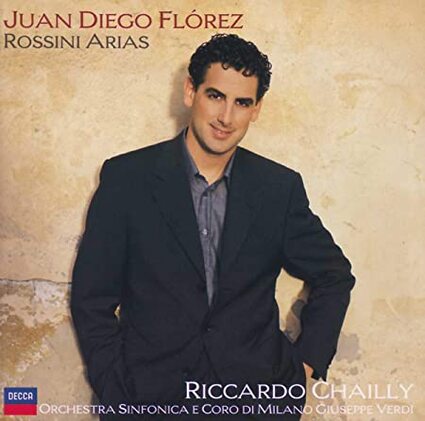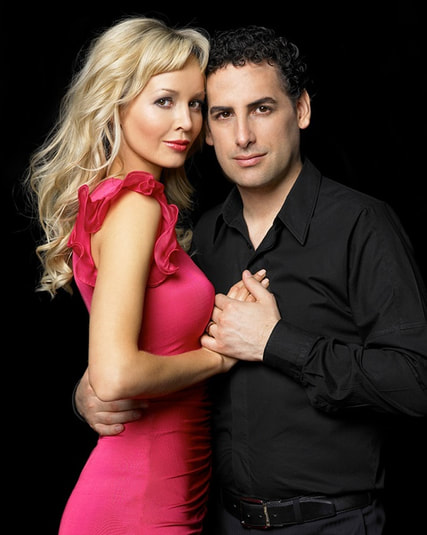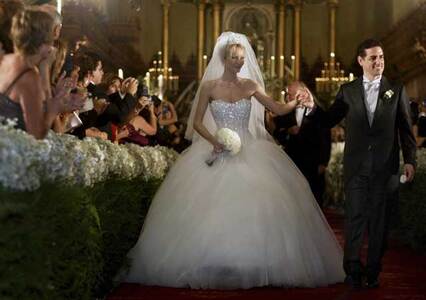|
Olga Zabotkina was born on 18 January 1936 in Leningrad, USSR. She studied at the Leningrad Choreographic School (class of N. A. Kamkova and V. K. Ivanova). She graduated and joined the Kirov Ballet (now Mariinsky) in 1953 and danced with them until 1978. Among her repertoire are Queen in Sleeping Beauty, Mercedes and Street Dancer in Don Quixote and character roles in Spartacus, Gayane, Legend of Love, Swan Lake, Raymonda, Stone Flower, Laurencia and Egyptian Nights. Olga Zabotkina was also an actress, known for Don Sezar de Bazan (1957), Cherry Town (1963) and Neokonchennaya povest(1955). Famed for her rare beauty, her film career did not last as long as her career as a dancer which lasted until the late 70s.
She married Alexander Ivanov(1936-1996), who was a poet and humorist. The couple did not have any children. After a long but difficult life which was saddened by illness in the last years, Olga Zabotkina died on 21 December 2001 in Moscow, Russia, and was buried in the Smolensk cemetery in St. Petersburg.
0 Comments
Juan Diego Flórez (born Juan Diego Flórez Salom, January 13, 1973) is a Peruvian operatic tenor, particularly known for his roles in bel canto operas. On June 4, 2007, he received his country's highest decoration, the Knight Grand Cross in the Order of the Sun of Peru. Juan Diego Flórez Salom (Lima, 13 de enero de 1973) es un tenor ligero peruano, mayormente reconocido por sus interpretaciones en óperas belcantistas. Es considerado como uno de los mejores tenores del panorama actual. BiographyJuan Diego Flórez was born in Lima, Peru in 1973, the son of María Teresa Salom and Rubén Flórez, a noted guitarist and singer of Peruvian popular and criolla music. In an interview in the Peruvian newspaper Ojo, Flórez recounted his early days when his mother managed a pub with live music and he worked as a replacement singer whenever the main attraction called in sick. "It was a tremendous experience for me, since most of those who were regulars at the pub were of a certain age, so I had to be ready to sing anything from huaynos to Elvis Presley music and, in my mind, that served me a great deal because, in the final analysis, any music that is well structured—whether it is jazz, opera, or pop—is good music". Initially intending to pursue a career in popular music, he entered the Conservatorio Nacional de Música in Lima at the age of 17. His classical voice emerged in the course of his studies there. During this time, he became a member of the Coro Nacional of Peru and sang as a soloist in Mozart's Coronation Mass and Rossini's Petite messe solennelle. He received a scholarship to the Curtis Institute in Philadelphia where he studied from 1993 to 1996 and began singing in student opera productions in the repertory that is still his specialty today, Gioachino Rossini and the bel canto operas of Vicenzo Bellini and Gaetano Donizetti. During this period, he also studied with Marilyn Horne at the Music Academy of the West in Santa Barbara. In 1994 the Peruvian tenor, Ernesto Palacio invited him to Italy to work on a recording of Vicente Martín y Soler's opera Il Tutore Burlato. Palacio subsequently became Flórez's teacher, mentor and manager and has had a profound influence on his career. Juan Diego Flórez's first breakthrough and professional debut came in 1996 at the Rossini Festival in the Italian city of Pesaro, Rossini's birthplace. At the age of 23, he stepped in to take the leading tenor role in Matilde di Shabran when Bruce Ford became ill. He made his debut at La Scala in the same year as the Chevalier danois (Danish Knight) in Gluck's Armide, and later in the year he sang the role of Georges in Meyerbeer's L'étoile du nord with Wexford Festival Opera. His Covent Garden debut followed in 1997 where he sang the role of Count Potoski in a world premiere concert performance of Donizetti's Elisabetta. Debuts followed at the Vienna State Opera in 1999 as Count Almaviva in Il barbiere di Siviglia and at the New York Metropolitan Opera in 2002, again as Count Almaviva. On February 20, 2007, the opening night of Donizetti's La fille du régiment at La Scala, Flórez broke the theater's 74-year-old tradition of no encores when he reprised "Ah! mes amis" with its nine high C's following an "overwhelming" ovation from the audience. He repeated this solo encore at New York's Metropolitan Opera House on April 21, 2008, the first singer to do so there since 1994. Flórez is also active on the concert stages of Europe, North America, and South America. Amongst the many venues in which he has given concerts and recitals are the Wigmore Hall in London, the Théâtre des Champs-Élysées in Paris, Lincoln Center and Carnegie Hall in New York, the Palau de la Música in Barcelona, the Teatro Segura in Lima, and the Mozarteum in Salzburg. In a departure from his usual repertoire, he sang "You'll Never Walk Alone" from the Broadway musical Carousel at the Berlin Live 8 concert in 2005. He was signed by Decca in 2001 and since then has released six solo recital CDs on the Decca label: Rossini Arias, which won the 2003 Cannes Classical Award; Una furtiva lagrima, which won the 2004 Cannes Classical Award; Great Tenor Arias which won the 2005 Echo Klassik award for the best arias and duets recital; Sentimiento Latino; Arias for Rubini, Bel Canto Spectacular and Gluck's Orphée et Eurydice, recorded live in May 2008. In addition to his official discography, almost all his professionally performed roles have been preserved in radio broadcasts, and many also by television. He also sang the UEFA Champions League Final Anthem in Madrid at the Santiago Bernabeu in 2010. Moving into more lyric roles, he made his debut in Massenet's Werther in Bologna in December 2016, returning to the role in Zurich in April 2017. The Diapason magazine critic described Flórez performance as a triumph, demonstrating his exemplary discipline in accent and phrasing, excellent shading and with the natural allure of a poet. Flórez has been recognized by his native country with several awards and distinctions. In May 2004, he received the Order of merit, from the Mayor of Lima; the Orden al Mérito por servicios distinguidos en el grado de Gran Cruz from President Alejandro Toledo; and was named an Honorary Professor of San Martín de Porres University. On June 4, 2007, he received his country's highest honor, the Knight Grand Cross in the Order of the Sun of Peru, from President Alan García. He has been an Austrian Kammersänger since 2012. Flórez also appeared on the 2-sol stamp, part of a series of five stamps honouring contemporary Peruvian musicians issued on November 29, 2004. It is highly unusual for a living opera singer to have been honoured in his home country this way, particularly one so young. (Flórez was 31 at the time). From the classical music world he has received the Premio Abbiati 2000 (awarded by Italian critics for the best singer of the year); the Rossini d'oro; the Bellini d'oro; the Premio Aureliano Pertile; the Tamagno Prize; and the L'Opera award (Migliore Tenore) for his 2001 performance in La sonnambula at La Scala. In 2009, Flórez was nominated for the Best Classical Vocal Performance in the 52nd Grammy Awards for his album, Bel Canto Spectacular (Decca). Flórez's head and chest registers are perfectly integrated, with no audible break in the passaggio. The ornaments of bel canto, including the trill, are well executed, and stylistic errors such as intrusive aspirates generally avoided. The singer's mastery of coloratura, typified in his Idreno (Semiramide) and Corradino (Matilde di Shabran), has been noted by multiple critics. Flórez married German-born Australian Julia Trappe in a private civil ceremony on April 23, 2007 in Vienna, Austria. They held a religious ceremony at the Basilica Cathedral in Lima on April 5, 2008, which some of Peru's leading citizens, including President Alan García and author Mario Vargas Llosa, attended. Flórez was present at the birth of his son, Leandro, who was born in April 2011. A daughter, Lucia Stella, was born in the family home in Pesaro, Italy, in January 2014. BiografiaJuan Diego Flórez es hijo del cantante y guitarrista de música criolla peruana Rubén Flórez Pinedo, acompañante de la célebre cantautora Chabuca Granda, y María Teresa Salom, hermana de Carlos Salom, integrante de una de las bandas de música experimental más reconocidas del Perú en los años 80, Laghonia, así como de la famosa banda de rock peruano We All Together. Inicialmente persiguió una carrera de cantante de música popular; cantaba covers The Beatles y Led Zeppelin y, según sus propias declaraciones en una reciente entrevista en el diario Ojo (de Lima), podía interpretar desde huaynos hasta canciones de Elvis Presley, a manera de reemplazo cuando el cantante del pub administrado por su madre se encontraba enfermo. Estudió en el Colegio Santa Margarita en Monterrico, en la ciudad de Lima. Estando en el cuarto año de educación secundaria conoció al profesor de música Genaro Chumpitazi Guerrero, quien le dio sus primeras clases de impostación vocal y lo hizo cantar como solista del colegio en concursos escolares y en presentaciones de zarzuelas con sus compañeros de promoción, y lo hizo ingresar al Conservatorio Nacional de Música (Perú) a inicios del año 1990. Su voz casi educada para el canto lírico surgió en el curso de sus estudios con el maestro Andrés Santa María. Durante este tiempo, fue miembro del Coro Nacional del Perú y cantó como solista la Misa de la Coronación, de Mozart, y la Petite Messe Solennelle, de Gioachino Rossini. Ingresó al Instituto Curtis de Filadelfia, EE. UU.,donde estudió entre 1993 y 1996, y comenzó a cantar en producciones de ópera estudiantiles en el repertorio por el cual es conocido hoy, Gioachino Rossini y óperas del bel canto de Vincenzo Bellini y Gaetano Donizetti. En 1994, el tenor también peruano Ernesto Palacio, lo invitó a Italia, a participar en una grabación de la ópera de Vicente Martín y Soler, Il tutore burlato, y se hizo subsecuentemente maestro y mentor de Flórez. La primera gran sensación y debut profesional de Flórez llegó con el Rossini Festival de Pésaro en 1996. Con 23 años, inicialmente iba a participar en un rol menor en Ricciardo e Zoraide y en el coro de otras, pero dejó las filas del coro para tomar el reemplazo del papel del tenor principal de Corradino en Matilde de Shabran, pues el tenor principal, Bruce Ford, estaba enfermo. Su presentación causó sensación y luego otra vez más en similares circunstancias reemplazando a Giuseppe Sabbatini. Ese mismo año hizo su debut en la Teatro de La Scala de Milán como el cavaliere danese en Armide, de Christoph Willibald Gluck. Luego siguió su debut en el Royal Opera House, Covent Garden en 1997, donde cantó el rol del conde Potoski en una versión de concierto (y la primera moderna) de Elisabetta, de Donizetti. Siguieron su debut en la Ópera Estatal de Viena en 2000 como Rinuccio en Gianni Schicchi, y en la Ópera del Metropolitan en 2002 como el conde de Almaviva en El Barbero de Sevilla. Ha recibido el Premio Abbiati 2000 (dado por los críticos italianos al mejor cantante del año), el Rossini d'oro, el Bellini d'oro, el Premio Aureliano Pertile, el Premio Tamagno y el Premio L'Opera award (Migliore Tenore) por su actuación del 2001 de La Sonnambula en La Scala. Firmó por Decca en 2001 y desde entonces ha lanzado cuatro CD de recitales solistas en el sello Decca: Rossini arias, que ganó el Cannes Classical Award de 2003; Una Furtiva Lágrima, ganó el Cannes Classical Award de 2004; Great Tenor Arias (2005) y Sentimiento Latino (2006), un recital con temas clásicos de la música popular latinoamericana. Los CD han encontrado críticas positivas que ensalzan su técnica. El más común agasajo acerca de su canto es su caracterización individual total de cada rol que toma. Admira a Alfredo Kraus. En octubre de 2003 Luciano Pavarotti declaró que el peruano Juan Diego Flórez podría ser su sucesor como cantante de ópera. Si bien Pavarotti le mencionó como su sucesor, tanto la crítica como el mismo Flórez han declarado que, mientras Pavarotti fue un tenor lírico-ligero, Flórez es ligero, por lo que sus repertorios difieren. En julio de 2005 participó en los megaconciertos de Live 8 en Berlín, siendo el único peruano en participar en dicho megaevento. El 20 de febrero de 2007 rompió la tradición impuesta por Toscanini en la Scala de Milán y ofreció un bis en el estreno de La hija del regimiento, de Gaetano Donizetti, cuando en el papel de Tonio le tocó atacar el aria “Ah mes amis”, con sus célebres nueve “do” sobreagudos (do de pecho). En cuanto Flórez terminó de cantarla, los espectadores se pusieron de pie y aplaudieron durante más de cinco minutos. El último bis de un cantante en la Scala ocurrió en 1933, cuando el bajo ruso Fiódor Chaliapin tuvo que repetir "La calumnia" de El barbero de Sevilla, de Rossini. Flórez tiene una voz de tenor lírico ligero que, aunque no de gran amplitud, es, no obstante, audible incluso en los escenarios de mayor dimensión, debido al predominio de las altas frecuencias en su estructura armónica. Su rango vocal es de dos octavas, incluyendo el Mi bemol sobreagudo, registrado en 2009 tanto en actuación en directo (Zelmira) como en estudio, en el aria All udir de padre afflito, de Bellini, en el CD titulado Arias for Rubini. La parte más alta de su registro es particularmente poderosa y brillante, casi sin sensación de esfuerzo, mientras que las notas más bajas son comparativamente más pobres.
Los registros de cabeza y pecho se integran perfectamente sin interrupción perceptible en el passaggio. Su control de la respiración es impecable, lo que le permite prolongar las frases manteniéndolas con aparente facilidad. Ejecuta bien las florituras del bel canto, incluyendo el trino, mientras que generalmente evita los errores estilísticos como las aspiraciones intrusivas. Tal vez su rasgo técnico más distintivo es el dominio de la coloratura, que resulta especialmente patente en sus Idreno (Semiramide) y Corradino (Matilde di Shabran). El 8 de abril de 2008, el tenor español Plácido Domingo declaró su admiración por Juan Diego Flórez, del que dijo en Madrid: «Es el más grande tenor ligero de todos los tiempos, el máximo de su categoría. No me acuerdo de otro que haya cantado así ese repertorio tan difícil que él interpreta»; «cuando Juan Diego te canta con res bemoles y naturales, son verdaderos, no de falsete, verdaderos agudos», destacó el tenor español. |
Categories
All
Archives
December 2023
|
